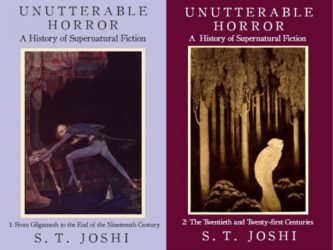 By S.T. JOSHI (HIPPOCAMPUS PRESS; 2012/14)
By S.T. JOSHI (HIPPOCAMPUS PRESS; 2012/14)
This two-volume study has already attained iconic status, and may well go on to become the premiere resource for devotees of supernatural fiction. Its coverage of the genre is admirably exhaustive, and enhanced by highly erudite prose that offers frank and unadorned judgments with a welcome absence of intellectual twaddle (i.e. there’s no space wasted on patriarchal overtones, modernist tendencies or what-have-you). Keep in mind, though, that author S.T. Joshi is extremely opinionated in his approach, and that his tastes are often quite eccentric.
Volume one covers horrific literature from THE EPIC OF GILGAMESH, hailing from 1700 B.C.E., to the end of the 19th Century. A description of GILGAMESH and its horrific properties opens the book, followed by the supernaturalism of the Greeks (Homer, Sophocles, Euripides, etc). Next come the Romans, apparently “mere copiers of the Greeks,” in the form of SATYRICON, THE AENEID, THE METAMORPHOSES and others.
There follow overviews of BEOWULF, a “fascinating product of the fusion of Christianity and paganism,” THE DIVINE COMEDY, MACBETH and THE TRAGICAL HISTORY OF DR. FAUSTUS. PARADISE LOST is briefly covered, although Joshi’s discussion is limited to Milton’s descriptions of Hell.
Far more ink is devoted to THE CASTLE OF OTRANTO, the novel that kicked off the gothic fiction craze of the late 18th and early 19th centuries, which according to Joshi produced “some of the worst drivel ever seen in English literature” (MELMOTH THE WANDERER aside). The next logical evolution occurred in the poetry and short stories of Goethe, Samuel Taylor Coleridge, John Keats, E.T.A Hoffmann and Washington Irving, and then Edgar Allen Poe hit the scene, impacting the genre indelibly. Joshi is appropriately effusive about Poe’s accomplishments, although he doesn’t think much of THE NARRATIVE OF ARTHUR GORDON PYM.
It’s in its coverage of Victorian-era horrors that the book gets especially controversial, with Joshi dismissing beloved classics like VARNEY THE VAMPYRE, A CHRISTMAS CAROL (“I fear the only way to salvage this work aesthetically is to assume that it is a parody”), UNCLE SILAS, THE STRANGE CASE OF DR. JEKYLL AND MR. HYDE, THE PICTURE OF DORIAN GRAY, THE BEETLE and even DRACULA, although he’s quite complimentary toward THE HOUSE OF THE SEVEN GABLES, THE TURN OF THE SCREW, THE KING IN YELLOW and the works of Ambrose Bierce.
Such is volume one of UNUTTERABLE HORROR. Volume two covers the 20th and 21st Centuries, beginning with profiles of Arthur Machen, Algernon Blackwood, Lord Dunsay and M.R. James. Joshi’s affection for the fiction of these “titans,” as well as that of Walter De La Mare, William Hope Hodgson, Gustav Meyrink, Franz Kafka and H.P. Lovecraft (to whom Joshi devotes an entire chapter), is fully evident.
Joshi also introduces us to quite a few tantalizing obscurities, such as the novels LOLLY WILLOWES by Sylvia Townsend Warner and THE GLIMPSE by Arnold Bennett, and also the “conte cruel” stories of France’s Maurice Level. It’s in Joshi’s coverage of more modern horror fiction that the going gets rough.
Joshi is complimentary about the work of Fritz Leiber, Charles Beaumont, William F. Nolan and Richard Matheson (although the latter’s HELL HOUSE is dubbed “very poor”), but his opinions on their successors aren’t very encouraging. He chides THE HAUNTING OF HILL HOUSE for being “diffuse and unfocused,” while the fiction of Robert Aickman gets knocked for its obscurantism. Stephen King is written off as a “schlockmeister” and Peter Straub taken to task for his self-importance. Joshi’s takes on William Peter Blatty, Richard Laymon, Dean Koontz, Robert McCammon and Ray Garton are even less complimentary, while the only Clive Barker work Joshi likes is THE DAMNATION GAME, and Joe Lansdale is noted solely for the novellas “Bubba Ho-Tep” and “On the Far Side of the Cadillac Desert with Dead Folks.”
The one modern horror writer Joshi unequivocally praises is Ramsey Campbell, whose HOUSE ON NAZARETH HILL is proclaimed the definitive haunted house story. Thomas Tryon’s THE OTHER, David J. Schow’s THE SHAFT and Norman Partridge’s SLIPPIN’ INTO DARKNESS are also singled out for praise, but for the most part the news is quite bleak regarding today’s horror fiction.
Once again: taken as a two-part whole UNUTTERABLE HORROR is unquestionably one of the absolute best studies of its kind, but be prepared for some major disagreements!
